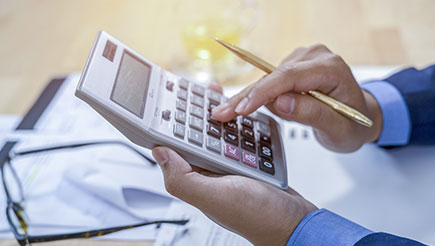Spanning stationery and phone bills to uniforms and staff costs, some small business expenses are tax deductible. But do you know which ones are relevant to your business?
Here we, rundown the expenses you’re entitled to claim and how to keep track of them - helping you to look after the pennies, so the pounds can look after themselves.
What are allowable expenses?
Allowable expenses are essential costs that keep your business running properly. They're tax deductible, which means you don't pay tax on the money you've spent. If, for example, you made £30,000 last year but spent £5,000 on allowable expenses, you would only be taxed on £25,000.
However, only certain things can be put down as an expense. Therefore, to ensure you don’t become an accidental tax avoidance target of HMRC, it's important to understand what's allowed and what's not.
What can you claim as an allowable expense?
While this list is not comprehensive, it'll give you an idea of what's considered tax deductible for UK small businesses, making it easier to sort through your allowable expenses when tax season starts.
Everyday business costs
Allowable expenses include your basic office costs such as stationery and the bills you pay on your business phone. Travel costs and staff salaries are also included, as is the cost of a uniform or other appropriate clothing (for example, if you work in a skilled or manual trade).
The cost of your business premises are covered, so keep receipts for any office rental or co-working space. Advertising and marketing costs are included too, so if you've paid money for a new website, it will be tax deductible. Products you buy to sell on are also eligible.
Financial expenses, such as the interest on your business loans, overdraft, credit card and bank charges are all allowable, including the cost of hiring an accountant. The cost of a regular company event is covered as long as the total doesn’t exceed £150 per person – good news for business owners who enjoy seeing their staff bust out their most impressive dance moves at the Christmas party.
Insurance costs
As a business owner, having business insurance grants a certain peace of mind, because you know that if an incident should occur, your hard work is protected. Similar to the day-to-day expenses incurred from running a business as listed above, insurance policy costs fall under allowable expenses if you prove that the cover is necessary solely for business purposes.
Popular types of business insurance including professional indemnity insurance , contents insurance , public liability insurance and employers’ liability insurance can all be claimed as business expenses at the end of the financial year.
Vehicle running costs
If you’re using a vehicle for business purposes, the running and maintenance costs can add up quickly. Luckily, under HMRC’s Approved Mileage Allowance Payments (AMAP), you can claim a specific amount per mile as a tax-deductible expense.
If you’re travelling by car or van, you can claim 45p per mile for the first 10,000 miles and 25p for each subsequent mile after this. Motorcyclists can claim 24p per mile and push bikes can claim 20p per mile, with no mileage restriction. For example, if you racked up 15,000 business miles with your car in a year, your mileage deduction for the year would be £5750. Keep in mind that the commute to your daily place of work is not tax deductible.
The mileage rate covers the costs of purchasing, running and maintaining your vehicle – including servicing, repairs, insurance, vehicle excise duty and MOT – as well as its depreciation in value. Incidental expenses linked to your business journey, including tolls, parking fees and congestion charges are not covered as well as any damage incurred on the route to or from work.
Make sure to keep a mileage log of your business journeys. Although you don’t have to submit this log when you claim your mileage deduction, HMRC can ask to see if your records and impose a fine if they’re branded inaccurate or misleading.
Assets vs. expenses: what’s the difference?
Unlike standard business expenses, high-value purchases, including computers, office furniture and machinery, should be held as assets on your company’s balance sheets. As the value of these items drops, the depreciation charges are listed as a company’s annual expense. However, company assets and these associated depreciation charges aren’t tax-deductible.
Instead, capital allowances grants companies tax relief on the value of purchases that fall under the definition of plant and machinery (office equipment) are used purely for business purposes on an ongoing basis for at least two years. This type of capital allowance is called the Annual Investment Allowance , which covers up to £200,000 of your relevant purchases each year.
The value of capital allowance varies according to the type of business expense. Purchases designed to encourage businesses to invest – including eco-friendly, energy-saving equipment – receive 100% tax relief against your company’s profits. Capital allowance can’t be claimed on items you lease, buildings (including doors, gates and shutters) or business entertainment.
Many small businesses don’t use capital allowances in their accounting though, because there’s a simpler method available. If you’re a sole trader or partnership and have an income of £150,000 or less a year, you may be able to use a system called cash basis accounting instead.
All of these ways of claiming expenses against you tax will be done on your self-assessment tax return at the end of the tax year. If you’d prefer to use cash basis accounting, you can read more about it on the UK Government website here.
Working from home allowable expenses
If you work from home you can claim a proportion of your bills as allowable expenses. This includes heating, electricity, internet and telephone, mortgage interest or rent and council tax. Because you're using the property for personal use as well, you can't claim your full bill.
You will need to find a fair (and sensible) method for calculating the right proportion. One way to do this is by working out how many rooms are in your home, and what proportion of the time you use your office space for work, and dividing your full annual bills by these to work out a percentage.
An easier option is to use the government's simplified expenses, a flat rate based on the number of hours per month you work from home. This is likely to be less (and less accurate), but will save you time.
What you can't claim as allowable expenses
Whenever you’re working out what allowable expenses your business can claim, always keep in mind that the costs need to have been incurred entirely, exclusively to the running of your business – you can’t claim for costs that have a dual personal and business purpose.
If you break the law and are fined, you won't be able to claim it back (another good reason to take out a professional indemnity policy), so keep an eye out for parking restrictions. If you buy a new property, you can't claim for the associated legal costs (although these can be claimed as capital allowances). As for travel expenses, you can only claim for business trips, not for daily travel between home and work.
You can only claim staff costs for people who work in your business: so you can claim for a personal assistant, but not for a cleaner or nanny. Although entertainment is a big part of winning (and keeping) clients, entertainment costs aren't covered.
How to claim allowable business expenses
To stay organised, set aside a specific time each week to make a note of the business expenses that you're liable to receive tax relief on so you don't lose out on any money. Note it all down in a spreadsheet that you continuously update it that way you’re not waiting until the last minute to get everything organised.
Not only will keeping organized make the allowable expenses process much simpler but if any of your expenses are queried, you’ll have proof that they’re legitimate – especially handy as HMRC can request proof of expenses up to six years after they’re claimed.
If you’re concerned about keeping receipts organised and undamaged, look into an electronic filing system that allows you to scan copies of receipts and store them digitally instead.
Expenses claims can be a complex area of taxation, so if you’re struggling with the intricacies of what allowable expenses your business can claim, consult your accountant and familiarize yourself with HMRC’s list of what costs are eligible.
What if I lost a receipt?
Whether or not you’ll be able to claim allowable expenses without a receipt will depend on the VAT status of your business.
If your business is not VAT registered, the rules on this are a bit grey as there is no official amount that required use of a receipt. If this happens – or you’ve just lost a receipt – then you should take down notes on what the purchase was, when the purchase was made, how much it cost, and why there is no receipt available.
Other proof of the transactions such as bank statements may also be useful evidence for documenting unreceipted allowable expenses, but this should not be used on a regular basis. While this gives a good bit of leeway, it is important to use discretion as HMRC must see the claim as reasonable.
If your business is VAT registered, then the rules are a bit stricter. If an expense is over £25 then there must be a VAT receipt otherwise you are unlikely to be able to claim that expense. For those under £25 it is still highly recommended you have a valid VAT receipt.
Don’t pay more business tax than you have to
It may seem like a hassle in the moment but you’ll reap the benefits of a well-ordered catalogue of your business receipts and invoices come the end of the tax year.
Claiming allowable expenses for your business isn’t about avoiding paying tax, it’s about making sure you’re paying what’s fair. As the cost of doing business gets higher and higher, claiming these costs back is a great way to save some money.






